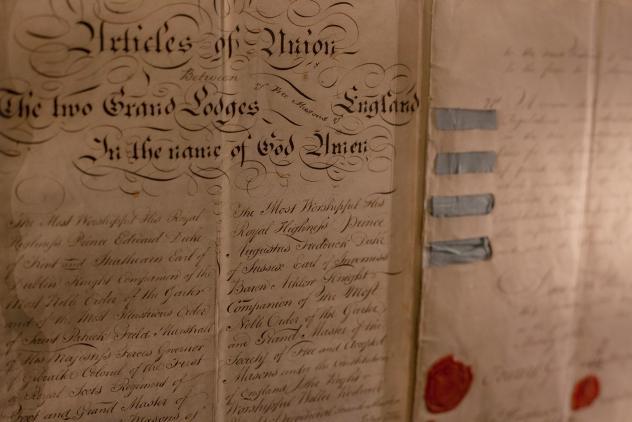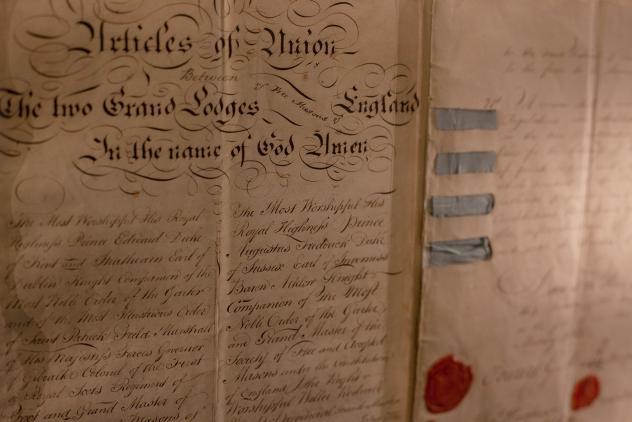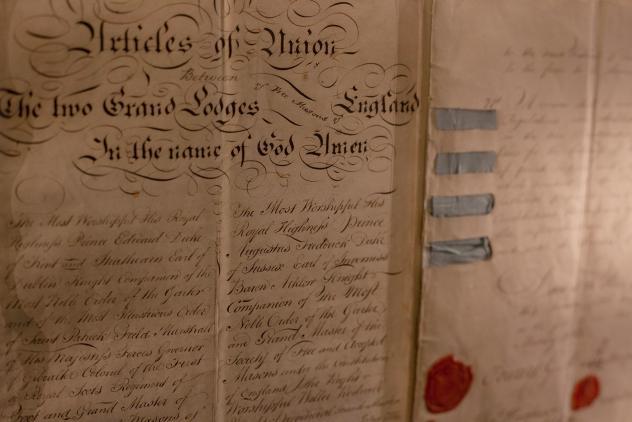ACCESS POLICY
Name of museum: The Library and Museum Charitable Trust known as The Museum of Freemasonry (“the Library, Museum and Archives”)
Name of governing body: The Council of the Library and Museum Charitable Trust
Date on which this policy was approved by The Council of the Library and Museum Charitable Trust: 13th June 2019
Date at which this policy is due for review: June 2024
-
Introduction
The Museum of Freemasonry houses one of the world’s leading collections of masonic books, artefacts and ephemera. The whole collection held by the Museum was awarded Designated status by the Museums, Libraries and Archives Council in 2007.
The purpose of the Library, Museum and Archives, as expressed in its Trust Deed, is:
To collect, preserve, conserve, display and make available to enquirers the archives, records, printed material, regalia, jewels and artefacts of Freemasonry and the continued running of a library and museum for the benefit of the general public and making the items available for research and education and the preservation of the items as collections
-
Purpose
The purpose of this policy is to set out the Museum of Freemasonry’s commitment to maximising access and to identify the ways in which we achieve this across the organisation.
-
Scope
This Access Policy relates to all collections held by the Museum of Freemasonry as well as activities, facilities, content and programmes onsite, offsite and online. This policy relates to access by our users and does not cover access in relation to staff, volunteers, freelancers or contractors.
-
Definition of terms
Access:
We consider access to mean the opportunity to engage with our public spaces, collections, content activities and expertise. There are a number of key barriers to access:
Attitudinal: e.g. Some may have a lack of interest in, or awareness of, the Museum of Freemasonry and Archives, the subjects and issues we deal with, or our programmes and services.
Language and Learning: e.g. Some may feel that the Library, Museum and Archives is too specialist in its approach to subjects and how they are presented; they may have learning disabilities which affect the ability to engage with the Library, Museum and Archives; or not be able to speak English.
Cultural: e.g. Some may feel the Museum of Freemasonry is not relevant and does not reflect cultural or social heritages or interests.
Economic: e.g. The Museum of Freemasonry is free to visit, but not all can afford the travel and associated costs to visit the collection or take part in our programmes.
Geographic: e.g. Some will live too far away to visit the Museum of Freemasonry.
Physical and Sensory: e.g. Physical disabilities, limited mobility, or hearing or visual impairments prevent access to the Library, Museum and Archives, our website, social media channels or programmes.
Technological: e.g. Some may have poor or no internet connectivity, or a low digital literacy; reliant on assistive software to engage with our collections and programmes in interact with screen-based technologies.
Legal: e.g. Access may be restricted by legislation, most commonly statutory protections for personal data, or by common law principals.
Audiences / users/ visitors:
We define audiences as individuals and groups who engage with and make use of, or might potentially engage with and make use of, the Library, Museum and Archive collections, resources, services, activities, content and programmes onsite, off-site and online.
Collections:
Further information relating to the Museum of Freemasonry’s collections can be can be found in the Collections Development Policy.
-
Responsibilities
The Director and Council to the Museum of Freemasonry are responsible for ensuring that it meets it obligations under the Equality Act (2010) by doing everything reasonably possible to make the Library, Museum and Archives accessible to the widest range of people.
Heads of Department are responsible for ensuring that the work of their colleagues take into account the need to maximise access by addressing the barriers outlined above.
Every member of staff involved in developing, delivering or maintaining spaces, activities, resources and other services for our users is responsible for making them accessible as possible.
-
Policy
The Museum of Freemasonry is committed to maximising access by, for example:
Physical access
- Upholding the statutory requirements of the Equality Act (2010) by taking reasonable steps to ensure that policies, practices and procedures do not discriminate against disabled people; by providing auxiliary aids and services, which enable disabled people to use the Museum of Freemasonry; and by removing, altering or circumventing physical barriers with our building
- Ensuring that lift access is provided to all spaces open to the public
- Ensuring that all our galleries, exhibitions (including individual exhibits), learning spaces (including interactive computers), cloakrooms, toilets and information desks are accessible to wheelchair users
- Providing plenty of accessible seating throughout our public spaces
- Assistance dogs are welcome
- Baby changing facilities are available
- The Museum of Freemasonry is committed to providing a safe environment for all. It has procedures for the safe evacuation of all users and staff in an emergency
- There is a range of resources available on the Museum of Freemasonry website for those who cannot physically visit the collections themselves. The Museum of Freemasonry is also active on several mainstream social media platforms
- Wherever possible, the Museum of Freemasonry will provide adequate signage and navigation to suit a range of needs, and will respond to requests made by the public regarding information required in alternative formats, as resources allow
Sensory access
- Following RNIB and Action on Hearing Loss good practice guidelines
- Ensuring that exhibitions and galleries use a good range of multisensory exhibits (e.g. touch, listen to)
- Large print interpretation is available for most temporary exhibitions and printed selected subjects.
- Handling opportunities will be provided where it is safe to do so and where resources are available
- Audio guides are available for the Three Centuries Exhibition in the North Gallery
- An Induction loop is fitted in the buildings’ Grand Temple, where tours take place
- Free public Wi-Fi is available throughout Freemasons’ Hall
Intellectual access
- Following guidelines provided by Mencap
- Ensuring that the text used in our galleries, exhibitions, educational resources, publications, website and social media channels is carefully tailored to the needs of their intended audiences
- Users have different needs and the Museum of Freemasonry is committed to an inclusive approach that recognises a range of different learning styles
- Public programming utilises a wide range of approaches appropriate to particular audiences. These include online and downloadable resources, print and digital marketing, learning resources, guided tours, facilitated sessions, lectures and public talks, research facilities, loans to other organisations and temporary exhibitions
- The Museum of Freemasonry uses its collections and expertise as a springboard for inspirational learning and creativity
- The Museum of Freemasonry offers opportunities to schools, colleges, community groups and artists to respond to the collection through a variety of creative practice
Attitudinal access
- Ensuring that our promotional activities present the Museum of Freemasonry as a welcoming, non-threatening, inclusive destination
- Ensuring the visitors are made to feel welcome on arrival and are put at their ease
- Creating environments in which people feel comfortable, valued and able to learn at their own pace and level
- All front-facing members of staff have appropriate training in customer care and an awareness of the possible barriers and access issues associated with Museum visits. The Museum of Freemasonry encourages an awareness in all staff of the Museum of Freemasonry’s public role.
- Members of staff aim to be excellent guardians of the Museum of Freemasonry’s collections, adding to them appropriately, and ensuring that they are conserved and documented to the highest standards
- The Museum of Freemasonry welcomes research visits to view collections off display by appointment, if suitable resources and supervision is available
Cultural access
- Making the Museum of Freemasonry and its programmes as relevant as possible to our culturally and socially diverse society
- Audio guides are available for the Three Centuries Exhibition in the North Gallery and are translated into 7 languages (English, French, German, Japanese, Portuguese, Italian and Spanish).
- In providing access, account will be taken of known cultural sensitivities and the opinion of source communities.
Economic access
- Maintaining free entry to the Museum of Freemasonry and ensuring we are open to the public six days a week, 49 weeks of the year
- The Museum encourages donations from all visitors but will continue to offer free services to target groups. Any income generated by these activities is reinvested into the Museum.
- Museum staff accept their responsibility to manage the Museum’s resources responsibly.
- Retail activity is appropriate for the Museum of Freemasonry and for visitors.
Geographic access
- The Museum of Freemasonry participates in providing object loans to other museums nationally and internationally.
- The Museum of Freemasonry aims to produce touring exhibitions.
- We aim to provide a rich online experience.
Research access
- The collections of the Library, Museum and Archives are available for research in person at the Museum of Freemasonry.
- The Library is not a lending library.
- Details about many Library, Museum and Archive resources are provided as records on the online catalogue.
- Access to Library and Archive resources is provided free of charge, on completion of a Reader Registration Form and after providing identification and proof of address.
- Lockers for readers’ bags and a coat rack are provided.
- Several power sockets are available for readers wishing to use laptop computers and a password for free Wi-Fi access is available.
- Readers are encouraged to contact Library, Museum and Archive staff in advance to discuss research and to find out about resources yet to appear on the online catalogue.
- Readers wishing to view items from the Museum collection that are not on public display but held in stores must contact the Curators in advance to arrange access.
- Some Archive resources are held off-site. In such cases three days’ notice must be given to retrieve items, which incurs a cost.
- In-house photocopying and a photographic services are available and current charges with guidelines are available on request.
- Readers wishing to take images for private study can apply for a self-service photography permit.
- The Museum of Freemasonry provides a search service for family history and biographical enquiries.
-
Related policies, legislation and guidance
The Museum of Freemasonry’s Access Policy is guided by relevant ethical codes and legislation:
- Equality Act (2010)
- Data Protection Act (2018)
- Copyright Act (1988)
The Museums Association’s access guidelines provide a useful overview of museums’ responsibilities to maximise access in the broadest sense- see www.museumsassociation.org/policy/guidelines
We are also guided by:
- Code of Professional Ethics, Archives and Records Association (2018)
- Code of Ethics for Museums, ICOM (2004)
- Ethical Principles and Code of Professional Practice for Library and Information Professionals, CILIP (2018)
A number of organisations provide specialist advice, in particular:
- Royal National Institute of Blind People (RNIB)- see www.rnbi.org.uk
- Action on hearing Loss (formerly RNID)- see www.actionhearing.org.uk
- Mencap-see www.mencap.org.uk
- Web Accessibility Initiative- see www.w3.org/WAI
Related policies:
- Collections Development Policy
- Loans Policy
- Museum of Freemasonry Forward Plan
- Access Plan



